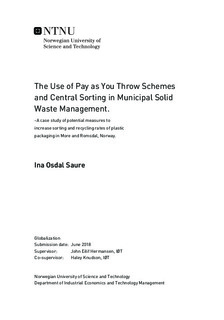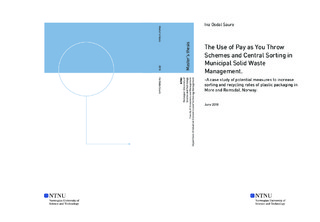| dc.description.abstract | As a contribution to achieving the future recycling targets for household waste as stated in the European Union s Waste Framework Directive (Directive 2008/98/EC), the potential of increasingly using differentiated waste fee (PAYT-schemes) and central sorting in the local municipal solid waste management has been explored. These measures were identified and recommended by the Norwegian Environment Agency (Miljødirektoratet) as important drivers towards reaching recycling targets set at 50 % for specific waste fractions in household waste, and especially with focus on plastic packaging waste and organic waste. This recycling target further increases to 65% by 2030. According to Statistics Norway, the recycling rate for household waste in Norway, was measured to be 38% in 2017, which means that Norway is lagging behind and urgent measures are needed if we want to achieve international agreed targets. Efficient sorting by the source in households is still viewed as the most important measure to increase recycling rates, however, it is necessary to evaluate if automated sorting of municipal solid waste (MSW) can function as an additional tool in today s municipal solid waste management systems.
This project is conducted in collaboration with the inter-municipal waste management agency Ålesundregionens Interkommunale Miljøselskap IKS (ÅRIM), situated in Aalesund and seek to explore the possibilities of establishing a local central sorting facility in Aalesund, through an association between the waste regions in More and Romsdal. The study provides a qualitative analysis on current MSW management systems in the different waste regions and evaluates how the use of PAYT schemes and central sorting can enable higher sorting rates and thereby recycling rates of plastic packaging in households. Results from the study indicates that PAYT schemes have a larger effect in municipalities with already low sorting rates of plastic packaging. In municipalities with higher sorting rates, the use of information and campaigns seems to release more effects and have helped enhance and stabilise subscribers' support of already existent sorting- and collection system. Findings suggest that the use of PAYT schemes will only take municipalities so far in increasing sorting rates of plastic packaging and achieving future recycling targets. Increased regional cooperation is suggested to enhance the efficiency of PAYT- schemes. In this study, a local central sorting facility has been deemed as a positive supplement to the existent sorting by the source systems in More and Romsdal. The use of central sorting is deemed as a constructive and necessary solution to recycle more complex plastic materials, achieve future recycling targets and to align waste management with circular economy principles. | |

